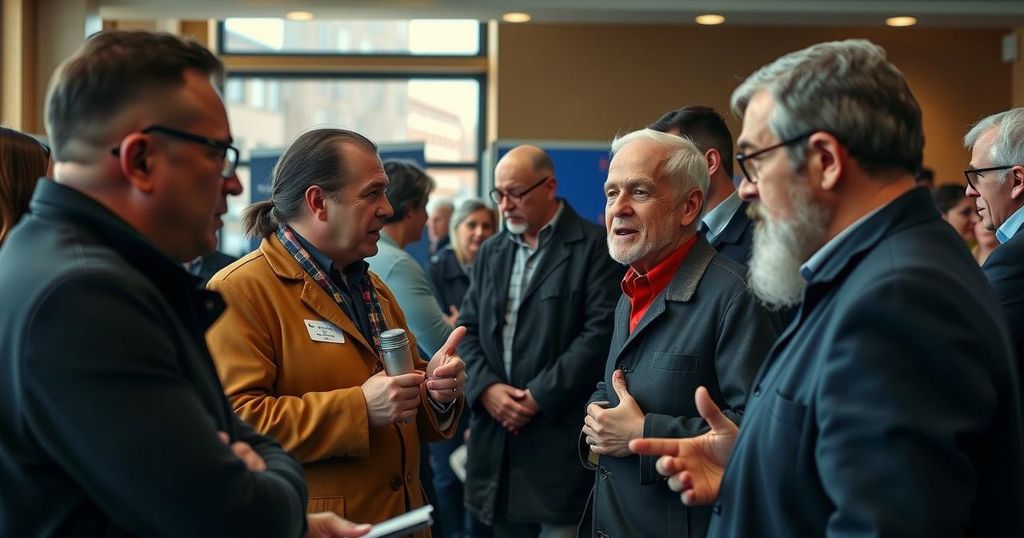As Election Day nears in Washington, voters are overwhelmingly focused on the presidential contest between Vice President Kamala Harris and former President Donald Trump, overshadowing local elections for governor and other offices. Interviews reveal a range of anxieties about Trump’s return, with local issues being eclipsed by national campaign narratives. Despite casting their ballots, many remain concerned about overarching issues like crime, the economy, and reproductive rights amidst a backdrop of political turmoil.
As Election Day approaches in Washington, voters exhibit considerable focus on a single contest—the presidential race between Vice President Kamala Harris and former President Donald Trump—rather than local elections and initiatives. This is the first gubernatorial election in twelve years alongside other significant statewide positions, yet discussions with voters reveal an overarching concern for the implications of the presidential election on local and national issues. Despite the multitude of candidates and initiatives on the ballot, ranging from new members of Congress to propositions that could affect taxes and climate policies, voters express a prevailing sense of anxiety regarding the potential outcome of the presidential race. Interviews conducted with a diverse group of voters reflect deep-seated fears regarding Mr. Trump’s possible return to power. For instance, David Phillips, a public health researcher, articulated a dread associated with the rhetoric of Mr. Trump, describing it as “terrifying, terrifying rhetoric.” Similarly, voters feel that the overwhelming media presence and campaign funding surrounding the presidential candidates overshadow their local electoral decisions, which they perceive as crucial but less compelling in the present climate of political uncertainty. Bob Ferguson, the Democratic candidate for governor, strategically utilizes this dynamic by associating his opponent with Mr. Trump in his campaign advertisements. Voter sentiments extend beyond the presidential race into issues such as reproductive rights, crime, and the economy, which remain at the forefront of discussions among constituents in Southwest Washington. A measurable polarization exists in voter opinions, with some expressing concern over crime and immigration, while others focus on social rights and environmental policies. As citizens cast their ballots, the task of making informed decisions becomes increasingly complicated by the overshadowing presence of the national political atmosphere. Amidst this context, election engagement remains remarkable yet fraught with apprehension. For instance, approximately 47% of registered voters in Washington had expressed their electoral preferences ahead of the election day, indicating a decrease from the turnout during the 2020 elections. This decline invites questions about public sentiment and the efficacy of transforming emotions into electoral action. The political landscape in Washington reveals a dichotomy of perspectives that complicates the statewide voting experience. While the race for governor and state attorney general reflects crucial local governance, the dominance of the presidential campaign captures the electorate’s collective psyche, fostering a climate of anxiety that transcends individual postal ballots. Voters are compelled to confront not only their immediate civic responsibilities, but also the broader ramifications of their choices on future national governance. This dynamic underscores the importance of local elections even amidst national distractions and emphasizes the critical need for candidates to address what matters most to their constituents in a politically volatile environment.
The upcoming elections in Washington signify pivotal changes, particularly with the state poised to elect a new governor for the first time in twelve years and numerous other statewide offices and congressional seats. Additionally, voters are faced with four statewide initiatives concerning taxes, fiscal stability, and climate policy. However, interviews with voters indicate that the overarching focus lies on the presidential race between Vice President Harris and former President Trump, eclipsing local concerns. Voter responses reveal a spectrum of emotions ranging from anxiety to fear, largely shaped by national discourse and Trump’s controversial populism. The resulting voter sentiment reflects an awareness of local governance intricately linked with the wider national political climate, shaping the electoral mood in Washington.
In conclusion, Washington voters, as they approach Election Day, exhibit a profound preoccupation with the presidential race, overshadowing local elections and initiatives that also demand attention. The emotions stirred by the prospect of a Trump presidency create a significant atmosphere of anxiety and apprehension amongst the electorate. This phenomenon highlights how national political narratives can influence local civic engagement and decision-making, suggesting that the outcomes of upcoming elections may hinge not only on local issues, but also on the broader political discourse dominating voter consciousness.
Original Source: www.seattletimes.com






